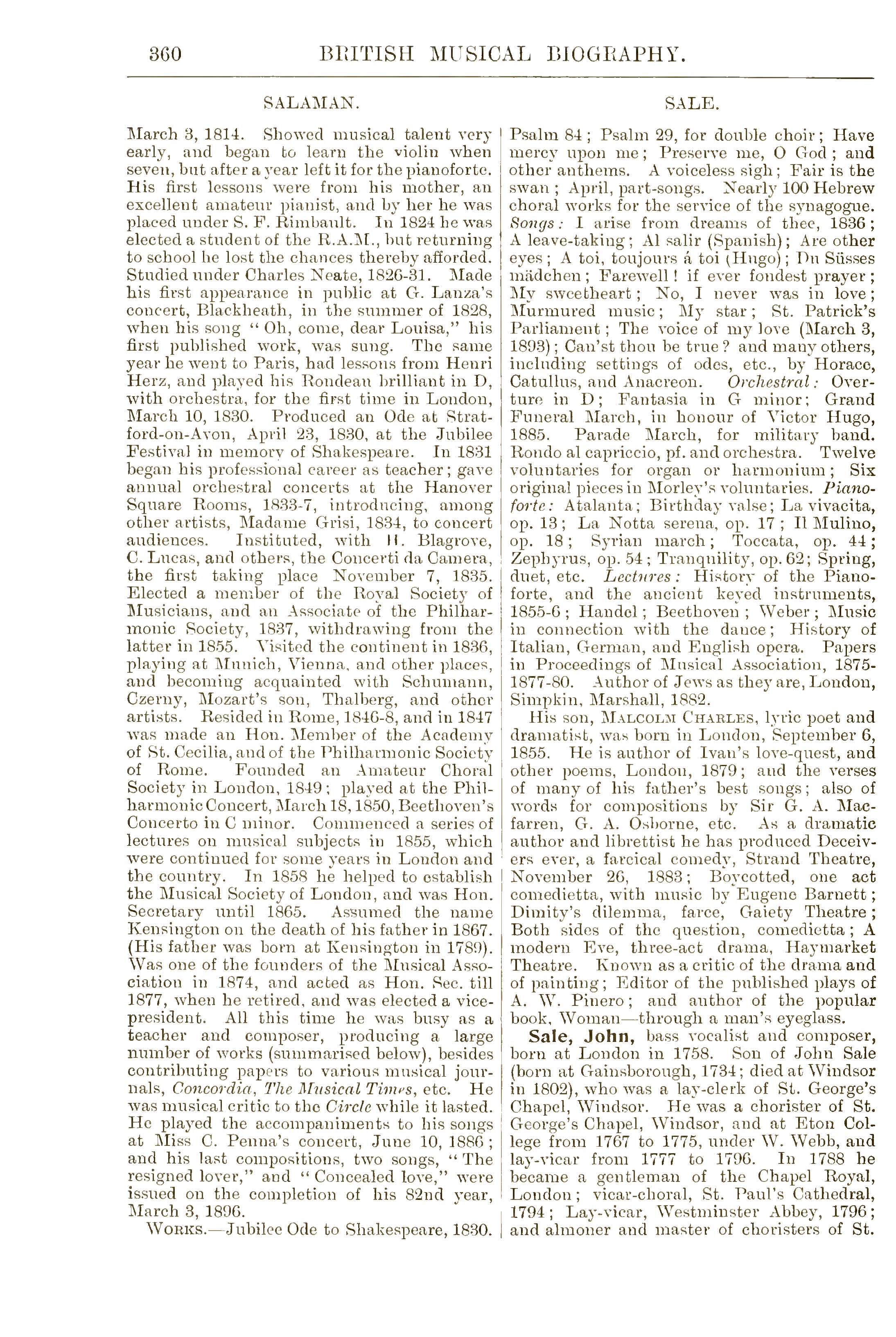| 55443: | March 3, 1814. Showed musical talent very |
| 55444: | early, and began to learn the violin when |
| 55445: | seven, but after a year left it for the pianoforte. |
| 55446: | His first lessons were from his mother, an |
| 55447: | excellent anlate^^r pianist, and by her he was |
| 55448: | placed under S. F. Rimbault. In 1824 he was |
| 55449: | elected a student of the R.A.jNI., but returning |
| 55450: | to school he lost the chances thereby afforded. |
| 55451: | Studied under Charles Neate, 1826-31. Made |
| 55452: | his first appearance in public at G. Lanza's |
| 55453: | concert, Blackheath, in the summer of 1828, |
| 55454: | when his song " Oh, come, dear Louisa," his |
| 55455: | first published work, was sung. The same |
| 55456: | year he went to Paris, had lessons from Henri |
| 55457: | Herz, and played his Rondeau brilliant in D, |
| 55458: | with orchestra, for the first time in London, |
| 55459: | March 10, 1830. Produced an Ode at Strat- |
| 55460: | ford-on-Avon, April 23, 1830, at the Jubilee |
| 55461: | Festival in memory of Shakespeare. In 1831 |
| 55462: | began his professional career as teacher ; gave |
| 55463: | annual orchestral concerts at the Hanover |
| 55464: | Square Rooms, 1833-7, introducing, among |
| 55465: | other artists, Madame Grisi, 1834, to concert |
| 55466: | audiences. Instituted, with H. Blagrove, |
| 55467: | C. Lucas, and others, the Concerti da Camera, |
| 55468: | the first taking place November 7, 1835. |
| 55469: | Elected a member of the Royal Society of |
| 55470: | Musicians, and an Associate of the Philhar- |
| 55471: | m.onic Society, 1837, withdrawing from the |
| 55472: | latter in 1855. Visited the continent in 1836, |
| 55473: | playing at Munich, Vienna, and other places, |
| 55474: | and becoming acquainted with Schumann, |
| 55475: | Czerny, Mozart's son, Thalberg, and other |
| 55476: | artists. Resided in Rome, 1846-8, and in 1847 |
| 55477: | was made an Hon. INIember of the Academy |
| 55478: | of St. Cecilia, and of the Philharmonic Society |
| 55479: | of Rome. Founded an Amateur Choral |
| 55480: | Society in London, 1849 ; played at the Phil- |
| 55481: | harmonic Concert, March 18, 1850, Beethoven's |
| 55482: | Concerto in C minor. Commenced a series of |
| 55483: | lectures on musical subjects in 1855, which |
| 55484: | were continued for some years in London and |
| 55485: | the country. In 1858 he helped to establish |
| 55486: | the Musical Society of London, and was Hon. |
| 55487: | Secretary until 1865. Assumed the name |
| 55488: | Kensington on the death of his father in 1867. |
| 55489: | (His father was born at Kensington in 1789). |
| 55490: | Was one of the founders of the Musical Asso- |
| 55491: | ciation in 1874, and acted as Hon. Sec. till |
| 55492: | 1877, when he retired, and was elected a vice- |
| 55493: | president. All this time he was busy as a |
| 55494: | teacher and composer, producing a large |
| 55495: | number of works (summarised below), besides |
| 55496: | contributing papers to various musical jour- |
| 55497: | nals, Concordia, The Musical Tinifs, etc. He |
| 55498: | was musical critic to the Circle while it lasted. |
| 55499: | He played the accompaniments to his songs |
| 55500: | at Miss C. Penna's concert, June 10, 1886 ; |
| 55501: | and his last compositions, two songs, " The |
| 55502: | resigned lover," and " Concealed love," were |
| 55503: | isi5ued on the completion of his 82nd vear, issued on the completion of his 82nd year, |
| 55504: | March 3, 1896. |
| 55505: | |
| 55506: | Works. — Jubilee Ode to Shakespeare, 1830. |



